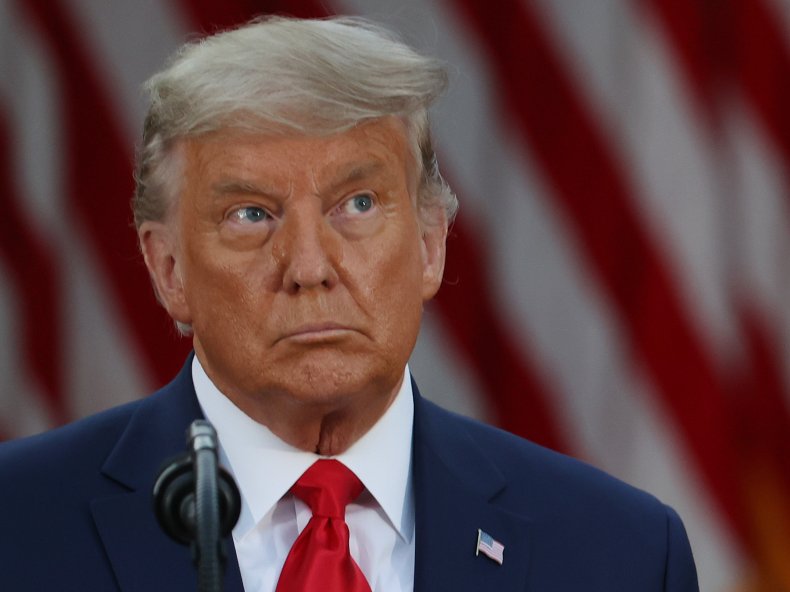The House Select Committee investigating the January 6 attack on the Capitol has given further incentive to the Department of Justice to pursue criminal charges against Donald Trump after detailing how the former president may have engaged in a "criminal conspiracy" to overturn the 2020 election results.
Lawyers for the panel looking into the events leading up to the insurrection have listed a number of ways they claim show how Trump and his allies engaged in potential illegal acts to defraud the American people over the election results and then attempted to prevent Congress from certifying his defeat.
The filings are the most detailed outline of potential crimes committed by Trump laid out by the panel.
The allegations, submitted in the U.S. District Court in the Central District of California, were filed in response to attempts by one of Trump's lawyers, John Eastman, to fight a subpoena issued by the panel while citing attorney-client privilege.
The committee argues that a judge should reject Eastman's attempts to block the subpoena ordering him to hand over documents, as the normally well-protected privilege cannot be used if the lawyer and his client are attempting to cover up or engage in a crime.
To back up its claim, the committee revealed an email from Eastman in which he appeared to admit that his and Trump's plans to stop the election results being certified in favor of Joe Biden were illegal.
As part of their effort, Trump and his lawyer attempt to put pressure on former Vice President Mike Pence to prevent the votes from being certified in Congress in his role as presiding officer of the Senate.
In one email to Pence's lawyer, Eastman wrote: "I implore you to consider one more relatively minor violation" of the Electoral Count Act to adjourn for 10 days to allow the legislatures to finish their investigations into non-existent voter fraud.
"[Eastman] knew what he was proposing would violate the law, but he nonetheless
urged the Vice President to take those actions," the filing states.
"The evidence supports an inference that President Trump, [Eastman], and several others entered into an agreement to defraud the United States by interfering with the election certification process, disseminating false information about election fraud, and pressuring state officials to alter state election results and federal officials to assist in that effort," the filing added.
"The Select Committee also has a good-faith basis for concluding that the President and members of his Campaign engaged in a criminal conspiracy to defraud the United States."
The filing also states there is evidence that Trump and his team may have committed common law fraud for repeatedly pushing false claims that the 2020 election was rigged due to widespread voter fraud.
"The President and his associates persisted in making 'stolen election' claims even after the President's own appointees at the Department of Justice and the Department of Homeland Security, along with his own campaign staff, had informed the President that his claims were wrong," the court documents state.
The January 6 House Select Committee is not conducting a criminal investigation and has no powers to bring forward any prosecutions.
Instead, the panel may use its findings to make a referral to the Department of Justice, which will ultimately decide whether to conduct a criminal probe into the former president. The panel's latest findings could be seen as an example of how a case could be put forward by federal prosecutors.
Committee Chairman Bennie Thompson previously said the panel would be "obligated" to refer evidence of potential crimes to the Justice Department, although it is unclear whether it intends to do so with the latest court filings.
In a joint statement, Thompson and Committee Vice Chair Liz Cheney suggested that the court filings provide evidence that a crime may have been committed.
"The facts we've gathered strongly suggest that Dr. Eastman's emails may show that he helped Donald Trump advance a corrupt scheme to obstruct the counting of electoral college ballots and a conspiracy to impede the transfer of power," they said.
Speaking to The Washington Post, former federal prosecutor Randall Eliason said that while the filings submitted by the Select Committee are "a major development," they are still only connected to civil proceedings concerning attorney-client privilege.
"To prove the actual crimes beyond a reasonable doubt, prosecutors would have to meet a much higher burden," Eliason said.
Eliason said the significance of the filings is that "the evidence being uncovered points clearly in the direction of possible criminal conduct by Trump himself" in connection with the efforts to overturn the election.
"We can be sure that the Department of Justice is in contact with the committee and is watching closely."
In a statement to Newsweek, Charles Burnham, lawyer for Eastman, said that the attorney has a responsibility to protect client confidences, even at "great personal risk and expense."
"Because this is a civil matter, Dr. Eastman will not have the benefit of the Constitutional protections normally afforded to those accused by their government of criminal conduct.
"Nonetheless, we look forward to responding in due course," Burnham added.
Trump has been contacted for comment.









